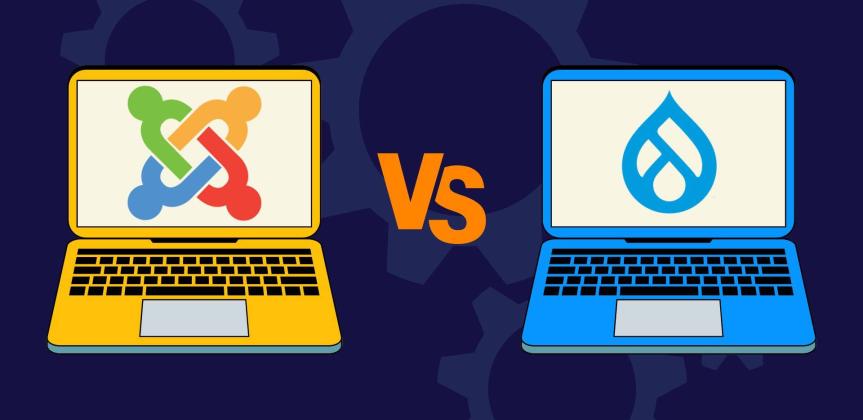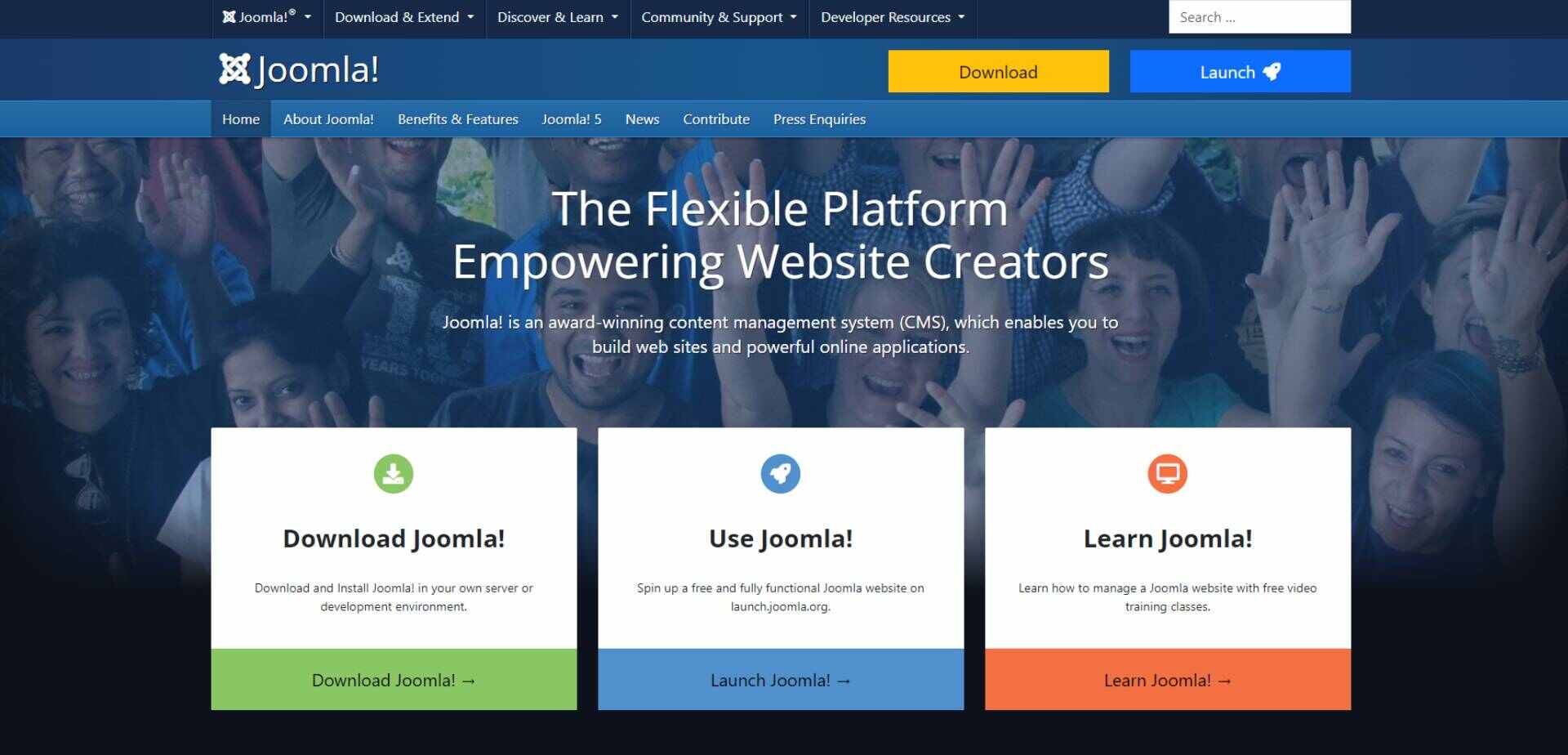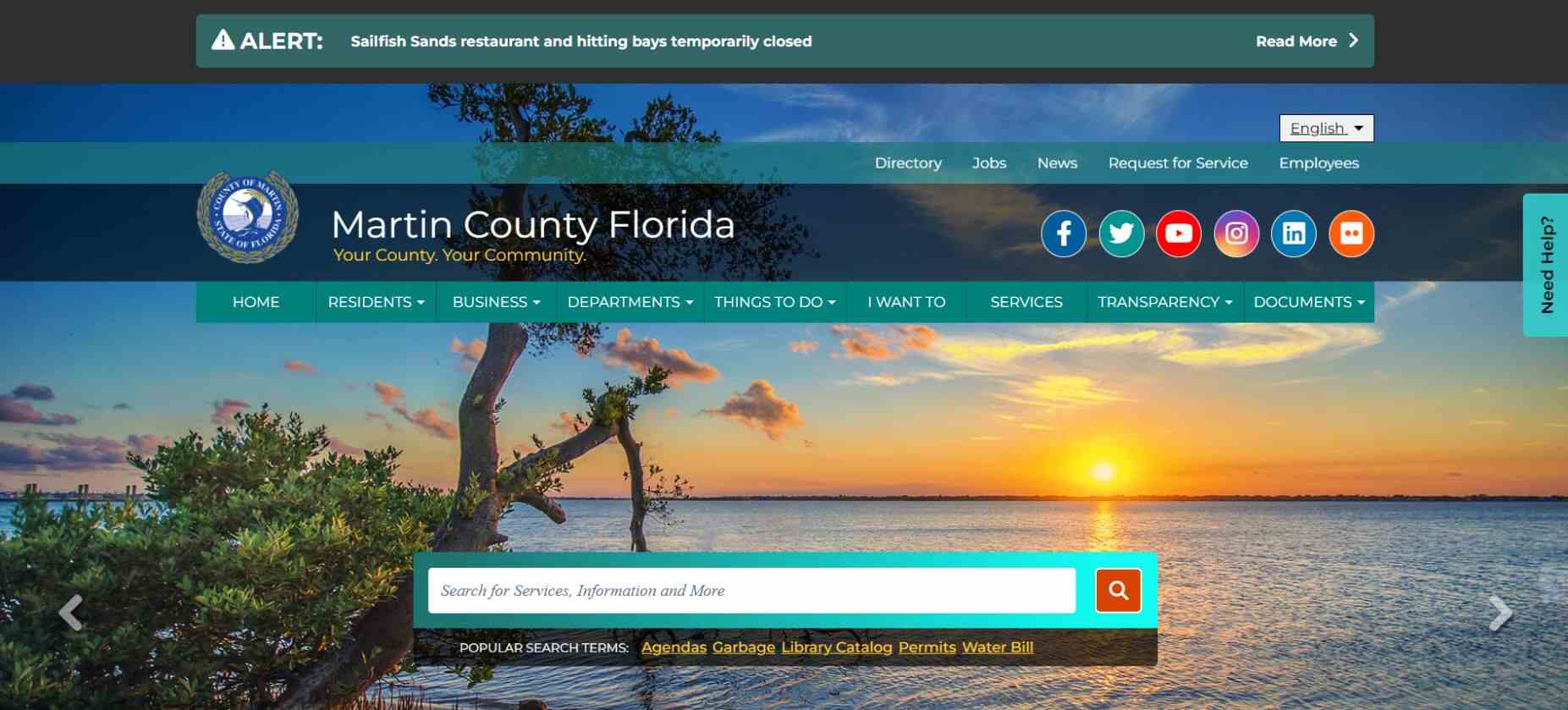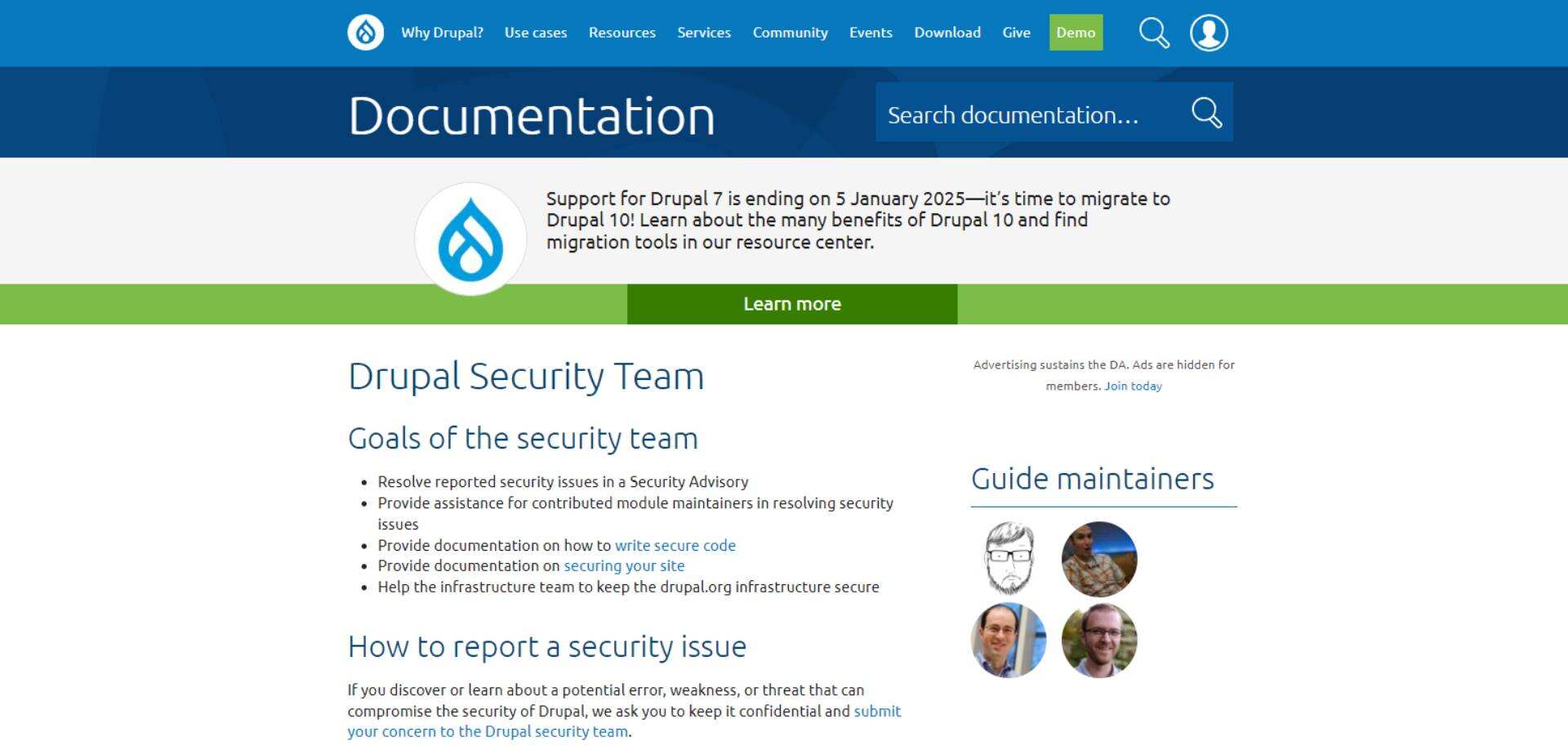
Drupal vs Joomla: A Breakdown for Municipal Websites
Note: This blog was first published on June 17, 2011, and has been updated to reflect new information and insights.
Takeaway: Choosing a CMS for a municipal website demands a solution that prioritizes public service, transparency, and secure citizen engagement. While both Joomla and Drupal offer powerful tools, understanding their key differences is key to making the best choice.
This guide dissects Drupal vs Joomla, comparing features, support, ease of use, and security to help you identify the ideal platform for your city's online presence.

Public information and services
Municipal websites serve as a critical bridge between governments and citizens. They offer a wealth of public information, from official documents and announcements to online forms and service portals. Choosing the right CMS for your municipal website, therefore, hinges on its ability to effectively manage and deliver this crucial content.
Joomla
Joomla is a user-friendly platform known for its intuitive interface and robust content management tools. Joomla excels at:
- Content organization: Content managers are able to easily create clear and structured page layouts, catering to different content types like news articles, council minutes, and service pages. These can also be organized using categories and subcategories.
- Forms and media managers: Content managers can streamline citizen interaction with online forms for service requests, applications, and feedback mechanisms. You can also choose between different kinds of form extensions depending on the capability you’re looking for. For images and files, they can be securely stored and managed using file managers for public access.
- Multilingual capabilities: Developers can set up a multilingual Joomla site to make content accessible and inclusive to a wider range of audience.
Having users across the globe access our site meant we needed to provide support for multiple languages. Joomla has robust multilingual features built in that allow us to easily create Spanish, French, German, and Italian translations throughout our site without needing to install any extra plugins. Managing separate versions of menus, articles, and other content for each language was straightforward with Joomla's detailed control panels and translation tools. Supporting global users was seamless.
—Eric Lam, Head of Business Strategy, Energy Credit Transfer
Drupal
Designed to handle complex information systems, Drupal is highly customizable and secure. Drupal shines in:
- Easy content management: Content managers can organize and categorize information using taxonomies for easy searchability and navigation. Multiple content types can also be created by developers to make content creation faster for content managers.
- API integrations: Connect your website seamlessly with external systems like GIS maps, online payment gateways, and data libraries.
- Multilingual capabilities: Ensure all your constituents can easily access your information and services by enhancing your site with Drupal’s robust multilingual capabilities.
The "ideal" CMS depends on your city's specific needs and technological capabilities. Evaluate your content types, project complexity, and future growth projections to determine which platform can best manage and deliver public information in a transparent and accessible manner.
For example, Marin County Health & Human Services needed alerts, stats, and new information to be created and displayed immediately during the height of the pandemic. Using Drupal made it possible for Promet Source to help the organization display critical information in a timely manner.
Citizen engagement and transparency
Beyond providing information, municipal websites act as vital platforms for citizen engagement and fostering trust in local governance. Choosing a CMS that empowers citizens to participate actively and access government processes transparently is crucial for building a strong and connected community.
Joomla
- Online forums: Developers can install forum extensions to create dedicated spaces for discussions and feedback on local issues, allowing residents to voice their opinions and concerns directly.
- Community features: Joomla users can facilitate online registration for volunteer programs, neighborhood watch groups, and community events through surveys, polls, and discussion tools.
- Social media integration: Social media platforms can be connected to Joomla for real-time updates, announcements, and interactive communication with citizens.
Drupal
- Interactive dashboards: Content managers can present key city metrics, budget information, and service performance data through dashboard modules. This helps empower residents to understand local decision-making processes.
- Public comment tools: Developers can implement secure and structured mechanisms for citizens to submit feedback and comments on proposed policies, ordinances, and projects through commenting and forum modules.
- Secure e-government functionalities: Forms enable online applications for permits, licenses, and public services. This can help streamline procedures, improve accessibility, and reduce administrative burden by reducing phone calls to staff.
If your residents have a history of high civic engagement, it’s crucial that your website won’t be just there to display information (although that’s important too). For example, Martin County, Florida’s website homepage encourages their residents to perform a task on their site by frontloading their search bar and services.

Accessibility and compliance
A truly effective municipal website is accessible to all citizens, regardless of their abilities. It should also comply with relevant regulations to avoid legal and ethical concerns. Choosing the right CMS for your municipality requires careful consideration of both accessibility features and compliance capabilities.
Joomla
- Built-in accessibility features: Administrators can head over to the dashboard and enable the accessibility features so backend and frontend users can experience an accessible site.
- Accessibility extension options: Joomla! also has other accessibility extensions to help your website be more compliant with WCAG standards.
- Community resources: Joomla has a variety of documentation available on making your website accessible, such as their programmers documentation, introduction to content accessibility documentation, and accessibility standards documentation.
- Privacy features: Joomla has privacy features created in response to GDPR, making it easier for developers and content managers to manage user data.
Drupal
- Strict adherence to accessibility standards: Drupal core adheres to WCAG 2.0 Level AA standards, ensuring a high baseline for accessibility. Drupal is currently working to be WCAG 2.1 AA compliant.
- Community resources: Drupal has accessibility coding standards as part of their GAAD (Global Accessibility Awareness Day) pledge, along with introductory documentation and additional resource recommendations.
- Compliance with data privacy regulations: Drupal offers robust features and modules to comply with data privacy regulations like GDPR and CCPA. They also offer documentation on privacy.
- Developer-friendly platform: Drupal's modular system allows developers to create custom accessibility solutions for specific needs.
Accessibility and privacy compliance are ongoing processes. Although having a great, accessible and privacy-conscious CMS from the get-go is a huge help, compliance to standards still needs actual checking by experts.
Regularly assess your website's accessibility features and update content to meet evolving standards. Investing in accessibility and compliance not only ensures inclusivity for all citizens but also demonstrates your commitment to transparency and ethical governance.
Security and data recovery
Online threats are a reality for municipal websites. Data breaches, cyberattacks, and natural disasters can disrupt critical services and erode public trust. Choosing a CMS that prioritizes security and offers robust disaster recovery options is crucial for protecting your city's online assets and ensuring website continuity.
Joomla
- Regular updates: Joomla’s Security Strike Team releases regular security updates to patch vulnerabilities and address emerging threats.
- Security extensions: Joomla’s extensions directory contains a wide range of security extensions to enhance protection, including firewall tools, spam filters, and malware scanners.
- Backup options: Developers can download extensions for backup and restore functionalities. This allows for quick recovery in case of data loss, hacking, or website malfunction.
My experience with Joomla has been a testament to its robust security features. Navigating the internet requires a platform that prioritizes user safety, and Joomla excels at providing a secure environment.
Its built-in security measures and regular updates contribute to a resilient defense against potential threats. In a world where online vulnerabilities are a constant concern, Joomla's commitment to safeguarding user data and maintaining a secure ecosystem sets it apart.
It has empowered me to build and manage websites with confidence, knowing that the platform will automatically protect valuable digital assets. Joomla's security features make it a reliable choice for anyone seeking a trustworthy and safe content management system.
—Perry Zheng, Founder and CEO, Pallas
Drupal
- Robust security architecture: Drupal's core architecture is built with security in mind, featuring sandboxing, user permissions, and brute-force detection.
- Regular updates and security advisories: Because of Drupal’s strong number of developers, and their dedicated security team, security issues are quickly detected, fixed, and documented. Developers are also dedicated to consistently updating both Drupal itself and its modules to ensure any vulnerabilities are addressed.
- Multi-layered disaster recovery plans: Drupal offers modules and documentation for disaster recovery, including data backups, server redundancy, and failover options.

Our team at Promet Source are strongly dedicated to website security. We advocate that you regularly review your security features, update software, and test disaster recovery plans to ensure your municipal website remains protected and resilient against any potential threats.
Scalability and future growth
Municipal websites are not static entities. As your city grows, its online presence needs to be resilient and flexible to meet new demands and accommodate increased traffic. Choosing a CMS that can scale efficiently and handle future growth is crucial for ensuring your website remains a valuable resource for your citizens.
Joomla
- Flexible extensions: Joomla's extensive library of extensions (around 6,000 according to ScalaHosting) allows you to add new functionalities and features as your needs evolve.
- Adaptable to moderate growth: Although Joomla does have a history of being used for large sites, the majority of information available suggests that the CMS is better suited to handling moderate increases in traffic and content volume, making it ideal for smaller to medium-sized municipalities.
- Low upfront costs: Joomla’s initial investment can be affordable depending on the hosting and maintenance you choose, making it a cost-effective option for budget-conscious municipalities.
Drupal
- Highly scalable architecture: Drupal's architecture is designed for large-scale deployments, capable of handling complex data structures and high traffic volumes.
- Future-proof platform: Owing to the active community that updates Drupal constantly and creates new modules (there are about 40,000+ by December 2023), the CMS can easily adapt to new technologies and integrate with other platforms, ensuring your website remains relevant in the long run.
- Potential for high maintenance costs: It’s not a secret that Drupal is a technical CMS and requires more technical expertise for implementation and maintenance, which may lead to higher long-term costs.
Scalability is not just about handling increased traffic. It's about adapting to your city's changing needs and technological landscape. Consider your future growth projections, potential for new functionalities, and long-term budget constraints when evaluating the scalability of each CMS.
Community support and need for maintenance
Municipal websites—like all websites—require constant care and maintenance to ensure optimal performance and security. Choosing a CMS with robust support options and a thriving community can significantly ease this burden and keep your website running smoothly.
Joomla
- Active community forums: Access a large and active community of Joomla users and developers for troubleshooting, advice, and resource sharing, with over 700,000 active users on the forum.
- Paid support options: Because Joomla is open source, there are companies that offer professional support packages for additional assistance with complex issues or customization.
- Extensive online resources: Joomla has a wealth of documentation, tutorials, and knowledge bases to help developers find answers to common questions and learn new skills.
The level of support available in the Joomla community has been a standout aspect of my experience. Whether it was troubleshooting a technical issue or seeking advice on best practices, I found an active community of users and experts always ready to assist. This support extended beyond mere problem-solving; it was a learning opportunity that enriched my understanding of web development and enabled me to enhance my sites in ways I hadn't initially considered.
—Josh Steppling, Broker Associate, Treasure Coast Real Estate
Drupal
- Large and dedicated community: Drupal developers benefit from having a support system that has more than a million members actively supporting each other through documentation, tutorials, and events.
- Professional support channels: Since Drupal is open source, website owners who choose Drupal can access paid support services from experienced Drupal agencies for ongoing maintenance, security updates, and custom development.
- Long-term stability: Drupal was released in 2001, while Joomla was released in 2005. Those four years have made a difference in building a well-established community to ensure long-term support and compatibility with future software versions.
Community support and maintenance are ongoing investments. Allocate resources for professional support if needed and actively engage in the community to leverage its expertise. A well-maintained website not only functions smoothly but also reflects your city's commitment to technology and service excellence.
Total cost of ownership
Choosing a CMS isn't just about features; it's about making a financially sound decision that considers both upfront and long-term costs. Evaluating the total cost of ownership helps you understand the financial impact of each platform and choose the one that best aligns with your budget and priorities.
Joomla
- Open source goodness: Joomla is an open-source platform, meaning there are no licensing fees to use the platform.
- Need for paid support and maintenance: While Joomla extensions are often free, ongoing maintenance and customization might require hiring developers or agencies if you don’t have Joomla developers in-house.
- Limited scalability: Joomla's scalability reaches a limit, potentially requiring migration to another platform if your city's website needs grow significantly.
Drupal
- Open source means technically free: Drupal is also an open-source platform, meaning it’s completely free to use.
- Potentially higher maintenance costs: Drupal's robust architecture and community support can minimize maintenance needs if you have a Drupal developer, but Drupal’s scalability also means higher costs.
- High scalability: Drupal's architecture can handle large-scale deployments and future growth, eliminating the need for platform migration in most cases.
We now have the advantage of an Open Source CMS that is aligned with the worldwide Drupal Community. The result is big benefits. Taking all factors into account, we estimate that the annual cost savings will exceed $100,000.
—Quazi Hashmi, Program Manager, County of Orange, California
Consider your city's budget, technical expertise, and future growth projections when evaluating the cost of each CMS. Check which would be more cost-effective in the long run for your municipal website.
User-friendliness and learning curve
For your municipal website to thrive, your team needs to be comfortable using and exploring it. Choosing a CMS with a user-friendly interface and manageable learning curve can save time, resources, and headaches in the long run.
Joomla
- User-friendly interface: Joomla offers a straightforward and intuitive interface, making it relatively easy for non-technical users to add content, manage pages, and perform basic tasks.
- Wide range of tutorials and resources: Joomla has its repository of online tutorials, documentation, and community forums make learning Joomla accessible, even for beginners.
- Plenty of customization options: Joomla’s extensions and themes make it a good choice for those who want to ensure their website looks inviting to their constituents.
Joomla's user-friendly interface and straightforward layout make navigating it a pleasure. Content managers feel in total control of the development process because the admin panel and dashboard lack confusing clutter. For me, I like that the WYSIWYG editor does not require knowledge of code. The user experience is improved by the simplicity of inserting photos using drag-and-drop, which makes Joomla a dependable option for individuals who value utility over complexity.
—Paul Phelps, Managing Director, Solent Power
Drupal
- Steeper learning curve: Drupal's robust features and flexible architecture come with a steeper learning curve, requiring technical knowledge or training for effective use.
- Developer-friendly platform: Drupal caters to a developer-focused community, offering powerful tools and APIs for extensive customization and functionality.
- Strong customizability options: With the amount of modules and themes Drupal has, customization is one of its strongest suits. Promet Source also built Provus®, a component-based design system, to make content creation, editing, and customization much easier for developers and content managers.
Promet was very responsive to our needs and really cared. Our new site meets the moment. We got exactly what we wanted and feel very proud of how it looks and what we’ve achieved.
—Nicole Bronzan, Vice President of Communications and Content, Council on Foundations
Consider your team's technical skills, available resources, and potential for ongoing training when between Drupal vs Joomla. A balance between user-friendliness and advanced features can empower your team to manage your website effectively and adapt to your needs.
Should you choose Drupal or Joomla for your municipal website?
After comparing the two platforms based on the above criteria, we can see that both platforms have their strengths and cater to different needs. Here's a quick summary:
Public information and services
- Both offer robust tools to organize, manage and deliver public information and services.
- Joomla excels at intuitive content organization, forms/media managers and multilingual capabilities.
- Drupal stands out in taxonomies for searchability, API integrations, and multilingual support.
Citizen engagement and transparency
- Both enable online forums, community features and social media integration.
- Drupal has more advanced options like interactive dashboards, public comment tools and secure e-government functions.
Accessibility and privacy compliance
- Joomla has built-in accessibility features, extensions and documentation to aid compliance.
- Drupal adheres strictly to accessibility standards, offers in-depth resources and a modular system for customization.
Security and data recovery
- Joomla provides regular security updates, extensions like firewalls/malware scanners, and backup extensions.
- Drupal has security architecture built into its core, along with a dedicated security team, updates, and sophisticated recovery options.
Scalability and future growth
- Joomla is ideal for small to mid-sized cities with its extensions model and lower cost.
- Drupal excels at enterprise-level scale with advanced architecture designed for complexity.
Community support and need for maintenance
- Joomla has an active community forum, paid support options and extensive documentation.
- Drupal enjoys a huge dedicated developer community, professional assistance services and long-term stability.
Total cost of ownership
- Joomla is open source and has no licensing fees, but it may need paid support/maintenance if no in-house Joomla experts.
- Joomla has limited scalability may require platform migration.
- Drupal is also open source, so it's technically free to use, but there could potentially be high ongoing costs for maintenance because of its scalability.
- Drupal is highly scalable to handle future growth, lessening the need to switch to another platform.
User-friendliness and learning curve
- Joomla has an intuitive admin interface for ease of use.
- Joomla has online tutorials and documentation to make learning accessible.
- Joomla’s extensions enable customization without coding skills.
- Drupal has a steep initial learning curve for content managers and developers.
- Drupal is built to be developer-friendly with powerful modules for customization.
- Drupal has strong overall customization capabilities.
Overall, while both Joomla and Drupal are powerful CMS platforms, Drupal is better suited for larger municipal websites that demand enterprise-level content and data management, citizen engagement capabilities, and long-term expandability.
On the other hand, Joomla offers a more lightweight and affordable solution for medium-sized municipalities on more modest budgets that still needs robust public services and transparency. We suggest to carefully evaluate your city's online needs before deciding between these two quality open-source systems.
Ready to have a municipal website that's ready to serve your constituents? Contact our Drupal experts today!



